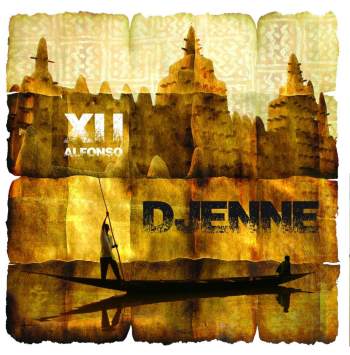Alfonso XII is a group from France which was founded in 1988 by four friends. Through the years they released several albums. Most of them had a theme about a historical person. People like Marco Polo, Charles Darwin, or Claude Monet were the subject of their concept albums. Music wise the band isn't easy to pigeonhole. Some people wrote they were inspired by Mike Oldfield. Other times when you hear the music on their albums other names pop up such as The Alan Parsons Project or even Pink Floyd. For some reviewers the music they released on their albums wasn't always easy to digest. The main reason for this is because they don't stick to one musical genre. They always integrate different styles such as progressive rock, New Age, Avant-garde, World Music, folk, classical music or jazz into their compositions. Their 2016 release Djenne is a good example that they don't copy their predecessor Charles Darwin (2012, see review). Those who liked this album will hear a complete different musical style on their seventh studio album. On this album the brothers Philippe Claerhout (guitar, mandolin, glockenspiel, bass, xylophone etc) and Francois Claerhout (string synth, orchestral sounds, synth, percussion etc) take you on a trip to the African culture. They do this with many other musical guests, just like they did on their earlier releases. However, this time around African musical friends are included as well-mostly Senegalese musicians and singers. They are needed to get you into the right mood for the subject they tell us about. On Djenne, the band takes a new musical turn. The title, Djenne, is an ancient city in Mali, a World Heritage Site by Unesco. The houses have walls made out of mud bricks. Those mud bricks gives you the characteristic colour of the album cover. Djenne is also the basis of a multicultural pre-Islamic civilization, exceptional testimony to the inter-religious tolerance. Djenne is known to have been not only an economic flagship in the Sahel near the first millennium, but above the soil of a multicultural pre-Islamic civilization, whose annual plastering by his famous mosque by all its inhabitants still is today a rare example of this celebrated tolerance between peoples and religions in a country who some unfortunately would plunge into darkness and chaos. The story of the album is told on nineteen different tracks which are biased to African instruments like the djembé, tama, sabax alongside more Western instruments such as drums, guitars and flutes. The story, meanwhile, is mostly sung and narrated in French, but also used is the non-tonal language Peul and English Fula. All together it is giving listeners a touch of world music. The nineteen titles offer a lot of classic passages from traditional African music, especially the second half of the album, but some pieces are more hybrids, offering local atmosphere mixed with more familiar elements of Western music. Alfonso XII combines all these local environments with more traditional elements to our Western ears. A special note is in order for the beautiful booklet accompanying the CD and the beautiful cover. This way you get totally into an African world while listening to this very special album. The main conclusion is that this release is rather strange in the XII Alfonso discography: The focus this time around is not on the mostly Western music of XII Alfonso, but the rich guest contributions of African musicians. The result is a concept, a collaboration of Western and African culture. Interesting and impulsive but it requires the listener's tolerance and openness. Music wise, lovers of progressive rock have little in common with what they hear most of the time. However, if you are open minded and into world music Djenne is worth trying to listen to. You might be as surprised as I was the very first time I heard it! *** Henri Strik (edited by Robert James Pashman) Where to buy? |
